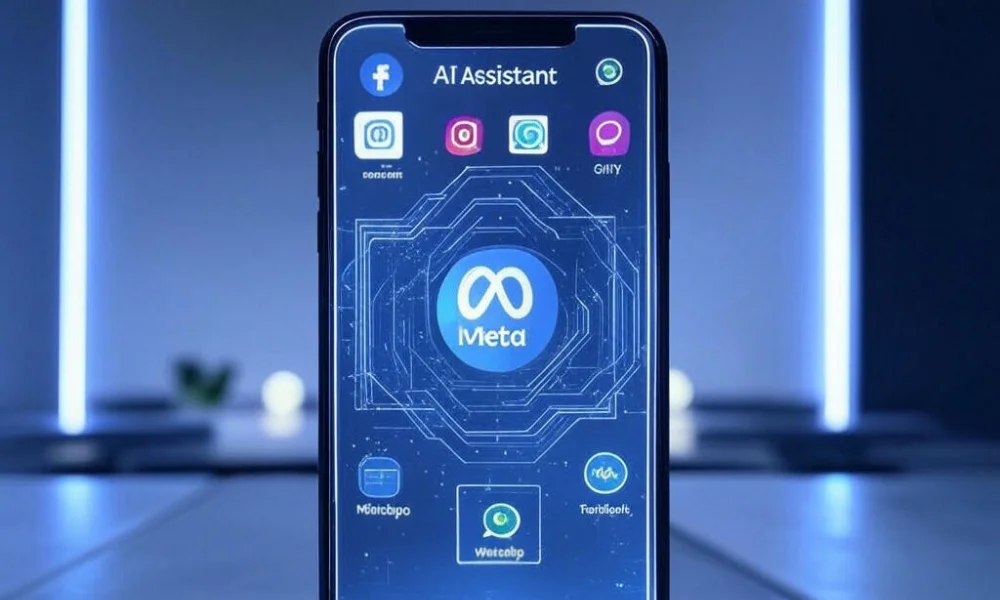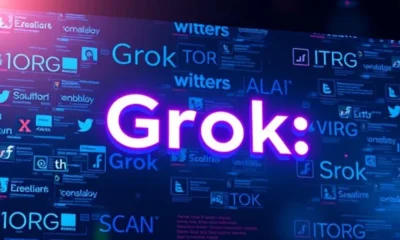Artificial Intelligence
Meta’s AI Push: The Standalone Assistant App Set to Rival ChatGPT
Meta’s new AI assistant app aims to reshape how we interact with technology, challenging industry leaders like ChatGPT. With a massive investment and integration into Meta’s existing platforms, can it really reach 1 billion users by 2025?

Tech news updates show how Meta’s recent AI initiative immediately attracted my focus due to its audacious nature. The independent AI assistant app Meta Platforms launched this week positions itself as more than a typical chatbot since it serves as an aggressive step toward competing with ChatGPT. Mark Zuckerberg as CEO of Meta has set a target to achieve one billion users for the AI assistant by 2025. A total of one billion users represents the level of determination Meta demonstrates in its plan to establish dominance in artificial intelligence.
Definition:
The artificial intelligence assistant application from Meta functions as an independent AI tools that generates real-time artificial intelligence conversations with humanlike characteristics.
This appealing direction from Meta fascinates me because it may transform my daily use of social media platforms and search activities and work applications. Embellishments to Meta go beyond social connection because the company develops future technologies based on AI foundations. This change affects my entire user base and all digital tool users in the United States who depend on these tools daily.
What is Meta’s AI Assistant App?
Primary reason behind my Meta AI application download was to assess the functionality contrast against ChatGPT. Currently Meta refers to this product as “Meta AI” and it serves as a tool to manage both question responses and creative content creation. This digital assistant provides me with quick research together with writing assistance within the same interface as my preferred smart assistance.
People find Meta AI powerful because it processes natural language through generative AI technology similarly to human understanding. Meta AI exists separate from ChatGPT by operating within the applications I currently use every day. The services of Meta AI operate within my regular digital life because it includes Facebook, Instagram and WhatsApp functionality.
Users can initiate the use of Meta AI through its standalone application while it appears during communication via Facebook messenger as well as Instagram posting activities. This capability makes it essential because I do not require a specific extra tool. I remain within the same realm where I already dedicate numerous hours each day. Several initial users found the tool enjoyable due to its quick functionality while other people requested expanded capabilities that include improved context and memory retention.
Zuckerberg’s Vision:
During his presentation Mark Zuckerberg delivered a simple message that explained the extensive AI investment from Meta. Zuckerberg stated that Meta’s mission goes beyond developing intelligent features because it aims to become the leading authority in AI technology which genuinely assists people. Zuckerberg envisions artificial intelligence will guide the coming decade so he has positioned Meta Company at its forefront.
Expansive long-term objectives of Meta align well with my understanding. Company seeks to develop AI technology which operates throughout all the products I access instead of limiting it to single application use. Meta is conducting AI integration across all services including Facebook along with Instagram and WhatsApp and its smart glasses platform. Meta aims to integrate artificial intelligence end to end to support both casual interactions with friends and also searches for information.
One key factor in Meta’s approach involves making its models freely accessible to developers although this move stood out to me as unexpected. OpenAI maintains control of its technological innovations as an organization whereas Meta extends invitations to developers who want to work with its AI platforms. The move demonstrates clear insight from Meta because it allows the company to extend its reach beyond users by influencing the development of the AI world. The company demonstrates its move from Metaverse promotion to actual world AI tool development.
The Investment: A $60–$65 Billion Bet on Infrastructure:
My reaction to Meta’s anticipated capital expenditure plan that reached $60 to $65 billion proved this was no ordinary experimental initiative. The money from Meta goes toward developing AI chips as well as major data center construction and top AI talent recruitment. The significant investment indicates that Meta needs to develop complete capabilities needed to operate its AI system of the future.
Large infrastructure plays a vital role since it powers the operation and training of AI programs including Meta AI. Real users like me and others will fail to achieve satisfactory results from AI models unless engineers provide both high-performing chips and ample data storage capacity. The company seeks direct control over the AI engine rather than merely obtaining its use from collaborating entities.
Meta is matching or surpassing the financial investments of its competitors Microsoft and Google and Amazon in their respective AI projects. The fast product releases and robust AI feature delivery may be possible through this investment. The rapid development of Meta’s AI platform gives the organization a chance to stay in front of competitors who still require cloud resources.
Competitive Landscape: ChatGPT, Gemini, and Others
A few dominating companies steer the present AI sector. ChatGPT from OpenAI maintains its status as the top AI assistant with its GPT-4 and GPT-5 model releases. Google has developed Gemini as a combination of Google Search capabilities and sophisticated AI-powered responses. I have conducted tests of Anthropic’s Claude platform because it emphasizes secure dialogues.
Large number of Meta’s daily platform users makes its AI system particularly significant to me. Meta AI stands apart from other assistants because it integrates directly with Facebook, Instagram and WhatsApp which provides it instant access to a large user base. Andrew Rogers sees how only Meta AI benefits from connecting Facebook Instagram and WhatsApp social media users thereby achieving network expansion that surpasses every existing AI helper today.
Open-source models developed by Meta distinguish the company from others while inviting developers to work with and enhance these models. Transition to adoption will be complicated because some users demonstrate either increased trust in ChatGPT or experience overload through AI enhancements in their social applications. Company’s extensive user base combined with its powerful resources position Meta to lead the market provided it continues to enhance its capabilities at speed.
Political Headwinds: Trump’s Tariff Threats Looming
Proposed tariffs by Trump continue to receive my attention through my monitoring of U.S. politics which may create disruptions for tech corporations including Meta. Supply chain of AI chips faces potential significant challenges because most advanced chips come from foreign sources. A shipment delay or price increase in AI chipset components would potentially decelerate Meta’s whole AI implementation program promptly.
Structural components which Meta depends on consist of hardware from NVIDIA and manufactured products from TSMC based in Taiwan. The difficulty of obtaining these chips due to tariffs might prevent Meta from completing its AI model training and scaling process. The impact of these restrictions would damage Meta as well as disable key AI features for users and all present Meta users.
U.S.–China tensions represent the major problem because it intensifies pressure on technical supply chains. Meta and similar companies might move production facilities or build inventory reserves of chips while also searching for alternative chip suppliers. Meta will probably address its chip challenges similarly to other tech giants through local supply chain investments and improved trade cooperation although these solutions will prove challenging to implement.
The Road to 1 Billion Users: Realistic or Ambitious
Mark Zuckerberg predicted that Meta’s AI assistant will reach one billion users by 2025 which seemed ambitious when he stated it. The large number of potential users intrigued me about the feasibility of this goal. I recalled that Meta currently reaches billions of people through its Facebook Instagram and WhatsApp user bases. The company already has substantial advantage due to its major user base.
User base alignment at Meta gives the company its largest competitive edge. Assistant appears automatically at my active digital locations therefore making adoption more easy-to-adopt. The system requires no new download and it does not force me to modify my regular activities. The combination of integrated services and Meta’s worldwide user network creates excellent conditions for rapid scale-up of this assistant.
Still, there are real challenges. The competition consists of strong rivals such as ChatGPT and Gemini. Government regulations aimed at protecting data as well as AI security continue to increase in number. User trust in AI is a crucial element that Meta needs to earn from its customers including myself. Meta requires more than mere download statistics to achieve success since it must convince users to actively use the platform and provide sustained engagement and worth to its users and advertising clients.
What It Means for the Future of AI?
New AI focus of Meta demonstrates a fundamental change which will transform my relationship with technological devices. Mainstream AI tools such as Meta AI help consumers with their needs in everyday tasks and creative development activities. Having reached this stage I understand that AI transcends business research boundaries as it will become an integral part of my everyday existence.
This development marks the beginning of what will evolve into AI ecosystem competition between companies. Microsoft and Meta and Google work parallel on developing dedicated AI-based platforms while challenging social media networks and search engine user bases. My interaction with various apps will transform because each platform selects its own AI systems for integration.
Trend of social media converging with intelligent assistants shows no indications of stopping. Meta’s innovation demonstrates that social advancement goes beyond digital content generation because people will naturally interface with AI assistants that comprehend their needs. Developers along with marketers will discover new approaches to generate user interactions through customized interactions which lead to better monetization potential.
This technology shift promises better individual-level customization in existing applications that I use. The development of these AI systems depends critically on privacy control and trust because multiple questions regarding these issues remain unanswered.
Conclusion:
Meta’s standalone AI assistant app launch represents a significant part of its extensive business strategy. Meta introduces its $60-$65 billion investment toward AI development as it aims to attract 1 billion users by 2025. The company is shifting its strategic focus on AI as its main growth opportunity beyond social media and Metaverse initiatives. Open-source models from Meta combine with its Facebook and WhatsApp and Instagram user bases globally to secure a commanding position for the company.
In my view this strategic move by Meta appears strategic yet it faces substantial dangers. The existing market rivals for Meta include OpenAI and Google with multiple other companies in this space. The integration between Meta and its established platforms gives the company an opportunity to address current challenges. Meta focuses on integrating AI into user-friendly daily experiences since it remains a core strength of the company.
My main concern centers on the matter of trust. Users should trust whether Big Tech firms like Meta handle data intelligently as they advance AI capabilities. What degree of power should human users have regarding these advanced tools?
Which platform would you prefer to use for AI assistance between Meta’s products and the more established AI companies? Your perspective on this matter would be valuable to me as you share it through the comment section.
-

 Artificial Intelligence8 months ago
Artificial Intelligence8 months agoHow to Use Grok AI: A Complete Guide
-

 Artificial Intelligence10 months ago
Artificial Intelligence10 months agoWhat is Artificial Intelligence? A Comprehensive Guide for Businesses and Enthusiasts
-

 Artificial Intelligence9 months ago
Artificial Intelligence9 months agoUnlocking the Power of Artificial Intelligence Tools
-

 Artificial Intelligence9 months ago
Artificial Intelligence9 months agoWhat is DeepSeek? Revolutionizing AI with Cutting-Edge Solutions
-

 Artificial Intelligence5 months ago
Artificial Intelligence5 months agoAI Technologies in Warehouse Automation:
-

 Artificial Intelligence5 months ago
Artificial Intelligence5 months agoPredictive Analytics for Demand Forecasting:
-

 Artificial Intelligence5 months ago
Artificial Intelligence5 months agoHow Artificial Intelligence is Revolutionizing Logistics:
-

 Artificial Intelligence8 months ago
Artificial Intelligence8 months agoWhat is Grok AI? A Game-Changing Chatbot with Real-Time Insights


